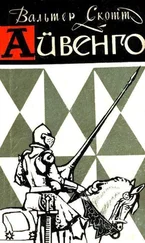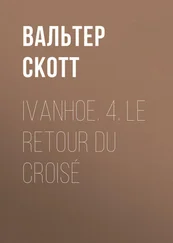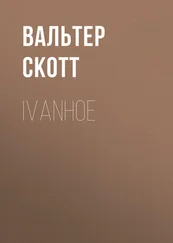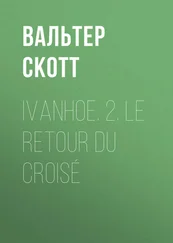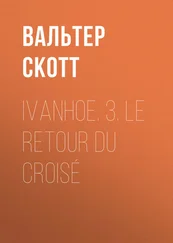The Templar left. Rebecca re-entered the room and gave thanks to the God of Jacob for His protection. She also prayed for the safety of her father and the wounded Christian, who was in the hands of his enemies.
* * *
The Templar met De Bracy in the hall of the castle. “You too,” said De Bracy, “have been disturbed, I suppose, by this sound. But you have come later and more reluctantly, and therefore I presume your interview was more pleasant than mine.”
“Have you been unsuccessful?” said the Templar.
“The Lady Rowena must have heard that I cannot endure the sight of women’s tears,” – answered De Bracy.
“And I have never met a woman more proud that this Jewish girl. But where is Front-de-Boeuf? That horn gets louder and louder.”
Soon Front-de-Boeuf joined them.
“Let us see the reason for this noise,” said Front-de-Boeuf, “here is a letter, and, if I am right, it is in Saxon.”
He looked at it, turning it round and round, and then handed it to De Bracy.
“It may be magic spells, I don’t know,” said De Bracy, who couldn’t read as well.
“Give it to me,” said the Templar. “We are half-priests and have some knowledge in addition to bravery. This is a formal letter of challenge, but it is extraordinary if it’s not a joke!”
“A joke!” said Front-de-Boeuf, “I want to know who jokes with me! – Read it, Sir Brian.”
The Templar read the following letter – ”I, Wamba, the son of Witless, Jester to a noble man, Cedric of Rotherwood, called the Saxon, – And I, Gurth, the son of Beowulph, the swineherd of the same person, with the help of our allies and confederates the Black Knight and the stout yeoman Robert Locksley demand that you, Reginald Front de-Boeuf, give freedom to Cedric of Rotherwood, lady Rowena, Athelstane of Coningsburgh, their servants, Isaac the Jew and his daughter. If you do not do so, we will treat you as a robber and fight you to your destruction.”
The knights heard this strange document read from end to end, and then gazed upon each other in silent amazement. De Bracy was the first to break silence by an uncontrollable fit of laughter.
“Stop laughing, sir,” said Front-de-Boeuf, “There are at least two hundred men assembled in the woods.”
“Shame on you, Sir Knight!” said the Templar. “Let us call our people, and attack them. One knight is enough for twenty peasants.”
“Not in the forest,” answered Front-de-Boeuf. “Attack? We don’t even have enough men to defend the castle. The best of mine are at York; and there is all your band, De Bracy. We don’t have more than thirty.”
“Send to your neighbours,” said the Templar.
“They are all at York,” answered the baron.
“Then send to York,” said De Bracy.
“And who will bear such a message?” said Front-de-Boeuf; “these robbers will catch the messenger and kill him. But I have an idea: Sir Templar, write an answer to this letter. Tell them that we are going to kill our prisoners and ask to send us a priest who can receive their last confession.”
This answer was delivered to Wamba and Gurth, with their allies the Black Knight and Locksley, and the hermit, who were waiting under the old oak. More than two hundred yeomen had already assembled near that place, and others were coming. A group of the Saxon servants of Cedric had arrived to assist in his rescue.
The monk did not understand French, so the letter was given to the Black Knight. He first read it to himself, and then explained the meaning in Saxon to his confederates.
“I think,” said the Black Knight, “that if they require a confessor, this holy monk can get into the castle and get us some information of what happens inside.”
“I am not a monk, when I am in my green cloak,” said the hermit.
“I fear,” said the Black Knight, “that there is no one here who can pretend to be a priest.”
“I see,” said Wamba, after a short pause, “that the fool must be still a fool, and put his neck in the adventure which wise men stay away from. I will put on a monastic cloak and go to my master Cedric.”
“Do it then,” said the Knight, “and let your master send us a message of their situation within the castle.”
“And, in the meantime,” said Locksley, “we will surround the castle so that even a fly will not be able to carry news from there.”
“Pax vobiscum, [23]” said Wamba, putting on his religious disguise.
He went on his mission, imitating the ceremonial manners of a monk.
* * *
When the Jester, who was dressed like a hermit, stood before the gates of the castle of Front-de-Boeuf, the soldiers asked who he was.
“Pax vobiscum,” answered the Jester, “I am a poor brother of the Order of St Francis, who came here to visit the unhappy prisoners of this castle.” The gates opened.
Wamba was brave, but his bravery almost left him in the presence of a man so dreadful as Reginald Front-de-Boeuf, and he pronounced his “pax vobiscum” with fear and hesitation. But Front-de-Boeuf was accustomed to see men tremble in his presence, so the timidity of the supposed father did not give him any cause of suspicion.
“Who are you, priest?” he said.
“Pax vobiscum,” answered the Jester, “I am a poor servant of St Francis. I was travelling and some robbers caught me and sent me to this castle in order to confess two persons condemned by your honourable justice.”
“Yes, right,” answered Front-de-Boeuf; “and can you tell me, holy father, how many robbers there are?”
“Sir,” answered the Jester, “there are at least five hundred men.”
The Templar, who came into the hall that moment, took Front-de-Boeuf aside: “Do you know the priest?”
“He is not from these lands,” said Front-de-Boeuf; “I don’t know him.”
“Then don’t trust him with your message,” answered the Templar. “Let him carry a written order to De Bracy’s company of Free Companions. In the meantime permit him to go freely to these Saxons, so that he won’t suspect anything.”
“Let it be so,” said Front-de-Boeuf. And he sent a servant to show Wamba the way to the apartment where Cedric and Athelstane were kept.
“Pax vobiscum,” said the Jester, entering the apartment; “the blessing of St Dunstan, St Dennis, St Duthoc, and all other saints be upon you.”
“Enter freely,” answered Cedric to the supposed friar; “what do you want with us?”
“To ask you to prepare yourselves for death,” answered the Jester.
“It is impossible!” replied Cedric, “They will not dare to kill us!”
“They will,” said the Jester, “so think, noble Cedric and Athelstane, what crimes you have committed during your life, because today you will be called to answer at a higher tribunal.”
“I am ready,” said Athelstane, “and will walk to my death as calmly as to my dinner.”
“Let us begin then, father,” said Cedric.
“Wait a moment, good uncle,” said the Jester, in his natural tone; “you should look long before you leap in the dark.”
“I know that voice!” said Cedric.
“It belongs to your slave and jester,” answered Wamba, taking off his hood. “Take this cloak and walk quietly out of the castle, leaving me your clothes.”
“But they will kill you!” said Cedric.
“Let them do so,” said Wamba.
“Wamba,” answered Cedric, “you shoud save Lord Athelstane instead of me.”
“No, by St Dunstan,” answered Wamba; “my good master, either go yourself, or let me leave as free as I entered.”
“Go, father Cedric,” said Athelstane, “I would rather remain in this hall a week without food than escape instead of you.”
Читать дальше
Конец ознакомительного отрывка
Купить книгу





